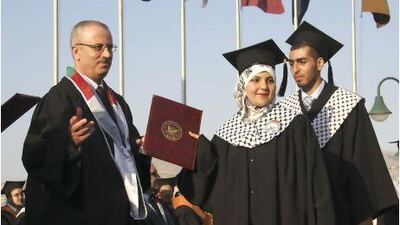RAMALLAH // The appointment of a little-known academic as Palestinian Authority prime minister has raised hope in the West Bank for fresh solutions to help an economy struggling under Israeli occupation.
Rami Hamdallah, president of Nablus's An Najah National University, was named premier on Sunday by Mahmoud Abbas, the PA president. The British-educated linguistics professor replaces Salam Fayyad, an internationally respected economist with limited support at home who resigned in April because of disputes with Mr Abbas's dominant Fatah faction.
Dianna Buttu, a former spokesperson for the Fatah-led Palestine Liberation Organisation (PLO), said many Palestinians wanted a shift away from the policies of relaxed bank lending, real-estate investment and institutional reform that came to define Mr Fayyad's six-year tenure.
Those policies earned Mr Fayyad respect from the United States and Europe, but at home his reforms were seen as failing to pressure Israel to end its 46-year occupation of the West Bank, Gaza Strip and East Jerusalem.
The local concern is whether Mr Hamdallah will "continue along the same trend of putting Palestinians into more debt, with the false guise of statehood, or whether he's going to think up policies to challenge the occupation", Ms Buttu said.
She said the prime minister should focus on providing political support to resist Israeli pressure, as well as financial support to Palestinians for home demolitions, arrests and settler attacks.
"He's going to have to fashion new strategies against the occupation, as well as Israeli policies of getting rid of Palestinians and taking their land," Ms Buttu said.
Mr Hamdallah's appointment comes amid efforts by John Kerry, the US secretary of state, to restart Israeli-Palestinian peace talks. Last week, he unveiled a US$4 billion (Dh14.7bn) aid package for the Palestinian economy as a sweetener.
Mr Kerry on Sunday welcomed Mr Hamdallah's selection and called for "a negotiated two-state settlement" with Israel that would allow Palestinians to build "a sovereign and independent" state.
Though affiliated with Fatah, Mr Hamdallah, 54, has little political experience and assumes a daunting portfolio. On top of steering an occupied economy that is heavily dependent on foreign handouts, he faces continued encroachment by Israeli settlers on land wanted for a Palestinian state.
He also must navigate fraught relations with Fatah's rivals, Hamas.
The factions signed an agreement last month to reinvigorate their stalled reconciliation efforts by forming a unity government by August and then holding national elections to reunite the Fatah-led West Bank with the Hamas-controlled Gaza Strip.
But Fawzi Barhoum, a Hamas spokesperson, said Mr Abbas, who has ruled by decree since his presidential term officially expired in 2009, "should have implemented the reconciliation" deal brokered between the factions instead of appointing Mr Hamdallah.
It was unclear when Mr Hamdallah will form a new government, which would be the fifth since 2006. Under Palestinian law, he has six weeks to form a government.
Hamas swept parliamentary elections in 2006, leading to a crisis that resulted in the group's takeover of Gaza from Fatah forces in 2007.
The deadlock has prevented Palestinians from holding presidential and parliamentary ballots.
Ayed Morrar, an activist from the West Bank village of Budrus who organises demonstrations against Israel's separation barrier, said villagers hoped to receive more support under Mr Hamdallah's leadership. That included financial support for peaceful protests against Israel, as well as for families of Palestinian prisoners in Israeli jails.
"Our leaders need to change their agenda to support activities that resist the occupation," he said, calling Mr Fayyad's policies "a distraction from our struggle".
But others doubt this would be a priority for Mr Hamdallah, a personal friend of Mr Abbas whose resume lists him as the general secretary for the Palestinian Central Elections Commission.
Hani Masri, an independent political analyst in Ramallah, said his appointment could be an attempt by Mr Abbas to consolidate his power. The Palestinian president, who also chairs Fatah and the PLO, had been at odds with Mr Fayyad because of the latter's independence in tackling such issues as corruption.
"He doesn't have an independent vision," Mr Masri said of Mr Hamdallah. "He will implement what the president wants him to do."
Abdul Sattar Kassem, a professor of political science at An Najah University, said Mr Hamdallah was chosen specifically because of his low profile. Other potential candidates could have angered Washington, and Israel, he said.
"He's not a political leader," Mr Kassem said. "We have a situation where we don't have political leaders any more, just people who listen to the demands of the Israelis and Americans."
Unnamed Israeli sources quoted by Haaretz newspaper described him as "pragmatic" with respect to negotiations with Israel, and said he had "developed professional contacts with many Israelis" over the years.
hnaylor@thenational.ae

